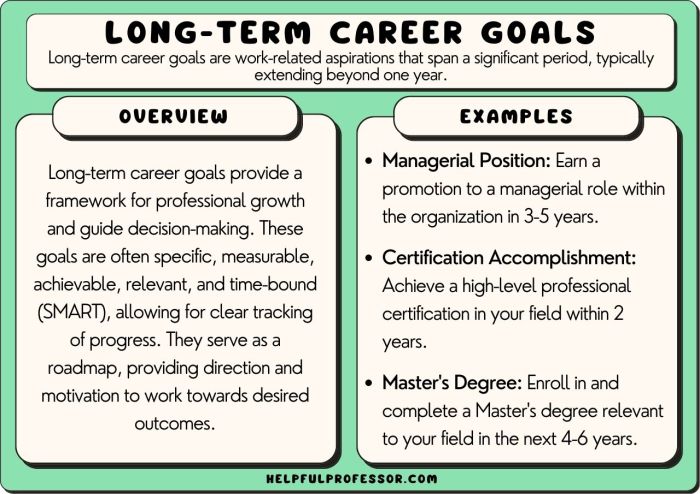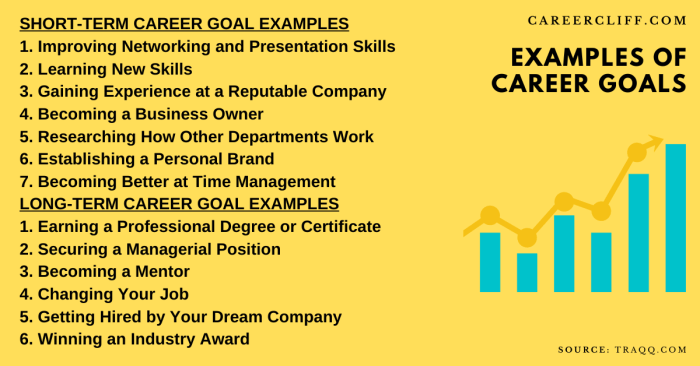Yo, diving into Career Development Goals, where we break down the keys to leveling up your professional game. From setting killer goals to crushing obstacles, get ready to boss up your career path!
Whether you’re aiming for that dream job or looking to climb the ladder, understanding how to navigate your career development goals is crucial. Let’s dig in and discover what it takes to reach new heights in your career journey.
Importance of Career Development Goals

Setting clear career development goals is crucial for professional growth as it provides a roadmap for individuals to follow in order to progress in their careers. Without clear goals, it can be easy to feel lost or stagnant in one’s career path.
Having well-defined career goals can lead to increased job satisfaction and motivation as individuals have a clear direction to work towards. When employees know what they are working towards, they are more likely to feel fulfilled and motivated in their roles.
Aligning personal values with career goals is essential for overall success as it ensures that individuals are pursuing paths that are meaningful to them. When personal values are aligned with career goals, individuals are more likely to feel fulfilled and satisfied in their careers, leading to greater success and happiness in the long run.
Types of Career Development Goals
When it comes to career development goals, there are various categories that individuals can focus on to enhance their professional growth and advancement. These categories include skill-based goals, position-based goals, and education-based goals. Each type of goal serves a specific purpose in guiding individuals towards their desired career outcomes.
Skill-Based Goals
Skill-based goals are focused on developing or improving specific skills that are relevant to one’s current job or desired career path. These goals often involve acquiring new technical skills, soft skills, or industry-specific knowledge. Examples of skill-based goals include mastering a new programming language, improving communication skills, or becoming proficient in project management techniques.
Position-Based Goals
Position-based goals revolve around advancing to a higher position within an organization or transitioning to a different role that aligns with one’s career aspirations. These goals may involve seeking a promotion, taking on leadership responsibilities, or transitioning to a different department to gain new experiences and skills. Position-based goals are essential for individuals looking to climb the corporate ladder and take on more challenging roles.
Education-Based Goals, Career Development Goals
Education-based goals focus on furthering one’s education and professional development through formal education programs, certifications, or workshops. These goals are aimed at expanding knowledge, acquiring new qualifications, and staying updated with industry trends. Examples of education-based goals include earning a master’s degree, obtaining a professional certification, or attending a specialized training program to enhance specific skills.
Short-Term vs. Long-Term Career Goals
Short-term career goals are specific objectives that individuals aim to achieve within a relatively short timeframe, typically within one to three years. These goals help individuals stay focused and motivated by providing clear and achievable targets. Long-term career goals, on the other hand, are broader aspirations that individuals aim to accomplish over a longer period, usually five to ten years or more. Short-term goals act as stepping stones towards achieving long-term goals, providing a roadmap for career progression and success.
Setting SMART Goals for Career Advancement
Setting SMART goals is crucial for effective career development as it provides a structured framework for goal setting and achievement. SMART goals are Specific, Measurable, Achievable, Relevant, and Time-bound, ensuring that goals are well-defined and actionable. By setting SMART goals, individuals can track their progress, stay motivated, and make informed decisions to advance their careers. Whether it’s mastering a new skill, aiming for a promotion, or pursuing further education, SMART goals help individuals stay on track and achieve their career aspirations.
Strategies for Setting and Achieving Career Development Goals

Setting and achieving career development goals requires careful planning and effective strategies. Here are some tips to help you along the way:
Assessing Current Skills and Identifying Areas for Improvement
When setting career goals, it’s important to start by assessing your current skills and identifying areas where you can improve. This can be done through self-reflection, seeking feedback from mentors or supervisors, and taking assessments to identify strengths and weaknesses.
- Reflect on your past experiences and accomplishments to identify skills you excel in.
- Seek feedback from colleagues or mentors to gain an outside perspective on your strengths and areas for improvement.
- Take skills assessments or personality tests to gain a better understanding of your strengths and weaknesses.
Breaking Down Long-Term Goals into Actionable Steps
Long-term career goals can seem overwhelming, but breaking them down into smaller, actionable steps can make them more manageable. This approach allows you to focus on specific tasks and track your progress along the way.
- Create a timeline with milestones to help you track progress towards your long-term goals.
- Break down your goals into smaller tasks or projects that you can work on regularly.
- Prioritize tasks based on their importance and impact on your overall career development.
Tracking Progress, Adjusting Goals, and Celebrating Milestones
Tracking your progress is essential for staying on track and making adjustments when necessary. Celebrating milestones along the way can also help you stay motivated and engaged in your career development journey.
- Regularly review your progress towards your goals and make adjustments as needed.
- Celebrate small wins and milestones to stay motivated and engaged in your career development journey.
- Seek feedback from mentors or colleagues to gain perspective on your progress and areas for improvement.
Overcoming Challenges in Career Development Goal Achievement: Career Development Goals
When striving to achieve career development goals, individuals often encounter various obstacles that can hinder their progress. It is crucial to be aware of these challenges and have strategies in place to overcome them.
Staying Motivated and Overcoming Setbacks
One common challenge individuals face is staying motivated throughout the journey towards their career goals. Setbacks, rejections, or failures can easily demotivate them. To overcome this, it is essential to focus on the end goal, celebrate small victories, and remind oneself of the reasons for pursuing those goals.
- Set short-term milestones to track progress and maintain motivation.
- Seek support from mentors, friends, or career coaches to stay motivated during tough times.
- Practice self-care and mindfulness to manage stress and stay positive.
Role of Resilience, Adaptability, and Continuous Learning
Resilience, adaptability, and continuous learning play a significant role in overcoming challenges and achieving career success. These qualities enable individuals to navigate through obstacles effectively and grow from setbacks.
Resilience is the ability to bounce back from setbacks and failures, learning from them and becoming stronger in the process.
Adaptability allows individuals to adjust to changing circumstances, explore new opportunities, and pivot when necessary to stay on track towards their goals.
Continuous learning ensures that individuals stay relevant in their field, acquire new skills, and adapt to the evolving demands of the job market.
- Embrace challenges as opportunities for growth and learning.
- Stay flexible and open to new possibilities in your career path.
- Commit to lifelong learning and skill development to stay competitive in the job market.